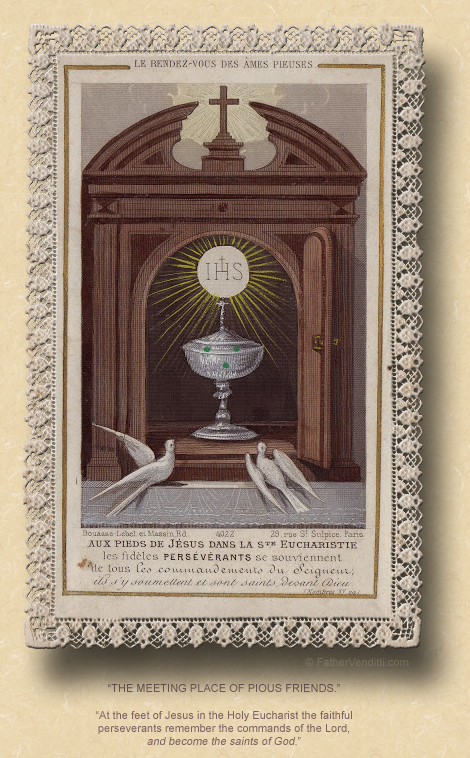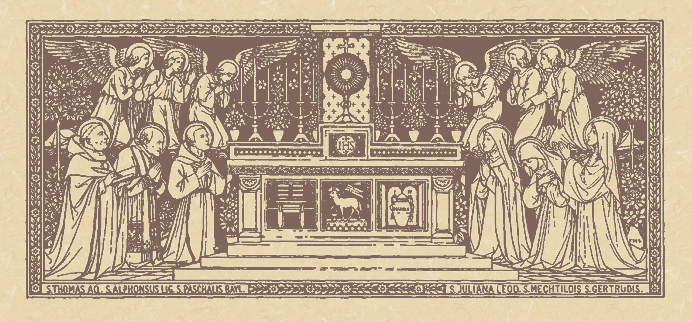He Pitched His Tent Among Us.
The Memorial of Saint Alphonsus Liguori, Bishop & Doctor of the Church.*
Lessons from the primary feria for the Seventeenth Thursday of Ordinary Time, according to the ordinary form of the Roman Rite:
• Exodus 40: 16-21, 34-38.
• Psalm 84: 3-6, 8, 11.
• Matthew 13: 47-53.
|
…or, from the proper:
• Romans 8: 1-4.
• Psalm 119: 9-14.
• Matthew 5: 13-19.
…or, any lessons from the common of Pastors for a Bishop, or the common of Doctors of the Church.
|
The Seventh Thursday after Pentecost; and, the Commemoration of the Holy Machabees, Martyrs.**
Lessons from the dominica,*** according to the extraordinary form of the Roman Rite:
• Romans 6: 19-23.
• Psalm 33: 12, 6.
• Matthew 7: 15-21.
FatherVenditti.com
|
 7:39 PM 8/1/2019 — Today our Blessed Lord finally wraps up his long string of analogies for the Kingdom of Heaven, with today’s final one probably being the most meaningful to many of His disciples, as so many of them were fishermen. Once again He emphasizes how good and evil are not sorted out until the end of all things by providing the image of a net full of fish: you don’t really know what’s in there until the day’s fishing is done and net is opened up. 7:39 PM 8/1/2019 — Today our Blessed Lord finally wraps up his long string of analogies for the Kingdom of Heaven, with today’s final one probably being the most meaningful to many of His disciples, as so many of them were fishermen. Once again He emphasizes how good and evil are not sorted out until the end of all things by providing the image of a net full of fish: you don’t really know what’s in there until the day’s fishing is done and net is opened up.
But, let’s focus today instead on our first Scripture lesson from Exodus, in which Moses builds … well, the Scriptures give it many names: the tent of meeting, or simply the Dwelling, which many translations render according to its Greek root, the “tabernacle,” which is where we get the name for that container in our churches which holds the Blessed Eucharist, because it is there that our Lord dwells. In point of fact, when the Blessed Apostle and Evangelist John opens his Gospel by telling us that “the Word became flesh and dwelt among us,” when you look at the Greek you realize that what he’s really saying, word for word, is “the Word became flesh and pitched His tent among us.”
The tabernacle or tent that Moses built was only the first attempt of man to provide a physical presence of God among them, and thus was a prefiguring of the incarnation. When God took flesh and was born into this world, it became a reality; but, that reality remains with us in the most Blessed Eucharist, which is every bit as real as was our Lord in His human form. Today’s Gospel lesson ends with our Lord leaving the place where He had been preaching because there was need to move on and spread His message and grace to others. In just this way, when the priest consecrates the host during Mass, he brings Christ to the altar, gives Him to us in Holy Communion, and often takes Him forth for the benefit of the sick.
By coincidence or Providence, today we observe the Memorial of St. Alphonsus Liguori, who wrote so beautifully about devotion to our Lord’s Eucharistic presence; so, with his intercession, let’s, therefore, use the occasion of this Mass to renew our devotion to the most Blessed Sacrament, and resolve to never pass up an opportunity to visit Him in the tabernacle.

* A Neapolitan nobleman by brith, Liguori (b. 1696) renounced all earthly things to become a priest. He established the Congregation of the Most Holy Redeemer to preach the Gospel to the poor. Forced against his will to accept the bishopric of St. Agatha in Southern Italy, he was illustrious for his preaching and his prolific devotional writings, particularly about the Holy Priesthood and the Blessed Eucharist. When well into his eighties, he was commisioned by the Church to write a massive and definitive text on moral theology. Accused, unjustly, of rigorism and scrupulosity by the enemies of sound moral teaching in the Church, he returned to the congregation he founded, died in 1787, and was proclaimed a Doctor of the Church at his canonization. His many devotional works remain very popular to this day, and have never been out-of-print.
In the extraordinary form, his feast is observed tomorrow.
** These seven holy brothers suffered martyrdom under Antiochus in the second century before Christ. The Missal of John XXIII does not offer a Mass for this commemoration; the commemoration is made by an additional Collect, Secret and Postcommunion added to those of the feria.
*** In the extraordinary form, on ferias outside privileged seasons, the lessons come from the previous Sunday.
|

